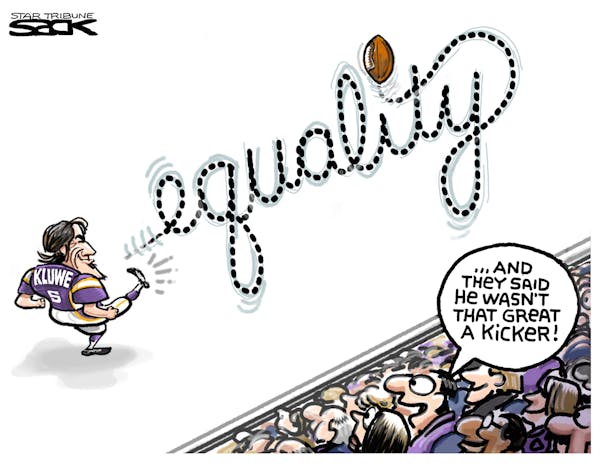Like many others, I was saddened to see that punter Chris Kluwe, despite good performances on the field, is being pushed out by the Vikings.
As sports columnist Chip Scoggins put it in Sunday's Star Tribune, "Regardless of whether they admit it, the Vikings are jettisoning Kluwe partly because they grew tired of his outspokenness."
More than anything else, Kluwe was outspoken about his opposition to last year's proposed constitutional amendment to ban same-sex marriage in Minnesota. In fact, his leadership on the issue was significant and important, since the measure was defeated. He not only was outspoken, he was effective.
In a less-important way, I also was outspoken in my opposition to the amendment. During the debate, I made my case against the amendment in several churches and community centers. I wrote two articles advocating defeat of the measure for this newspaper, and published pieces advocating a broader acceptance of marriage equality at CNN.com and other outlets.
Like Kluwe, I am a straight, white, relatively affluent man who felt the amendment was wrong. Like Kluwe, the subject didn't really relate to my job. He is a punter; I teach criminal law and sentencing, not family law.
There is a crucial difference between us, though. I am a law professor at the University of St. Thomas, a Catholic school. Not only is it Catholic, but it is a diocesan school, affiliated with the Archdiocese of St. Paul and Minneapolis (though it is neither owned by or governed by the archdiocese). As those familiar with the marriage amendment debate will remember, the archdiocese and its leaders played a key role in promoting the amendment I opposed. (St. Thomas itself did not take an official position.)
What is striking is the difference between my experience and Kluwe's. He may be out of a job at age 31, at the height of his abilities. My employer, meanwhile, made no mention at any point of my "outspokenness," despite the problems it might cause the institution. That's a pretty impressive shade of purple.
A key distinction, of course, is that St. Thomas is an academic institution, and it takes that role seriously. I am a professor with tenure, which gives me some protection to speak freely. Within the marriage amendment debate, that mattered, and in the best of ways.
Many of my colleagues disagreed strongly with my views, of course, from a position of faith. With many of them, I had worthwhile and productive discussions, and those discussions changed my mind about some aspects of the issue. Our students, moreover, had the benefit of hearing from advocates on both sides of the issue, and seeing the model of civil debate that we could provide.
A university is not a football team (though we share a color, purple). The two entities have very different goals. Still, in this instance, the football team could learn something important from the university I am so proud of. It is possible for "outspokenness" to be part of a good thing rather than a problem, and to let the public see more than one dimension of your most public employees. Players, like professors, are role models whether they want to be or not, and expressing principled beliefs and participating in civil discourse is an important part of such role modeling.
In fact, I sometimes refer to the NFL when I am talking about productive political discourse. The truth arises from the discussion itself; neither side alone has a complete claim to truth, because that will be forged through the fire of debate. It's like the Super Bowl: Both sides seek to win, but the purpose is defeated if only one team shows up.
"Outspokenness" is required if truth is desired.
-------------------
Mark Osler is a law professor at the University of St. Thomas.
Protect kids online

Here's how I'd broadly frame the environment that led to my firing as a teacher
Get rid of Minnesota's precinct caucuses, go to primary elections up and down the ballot


